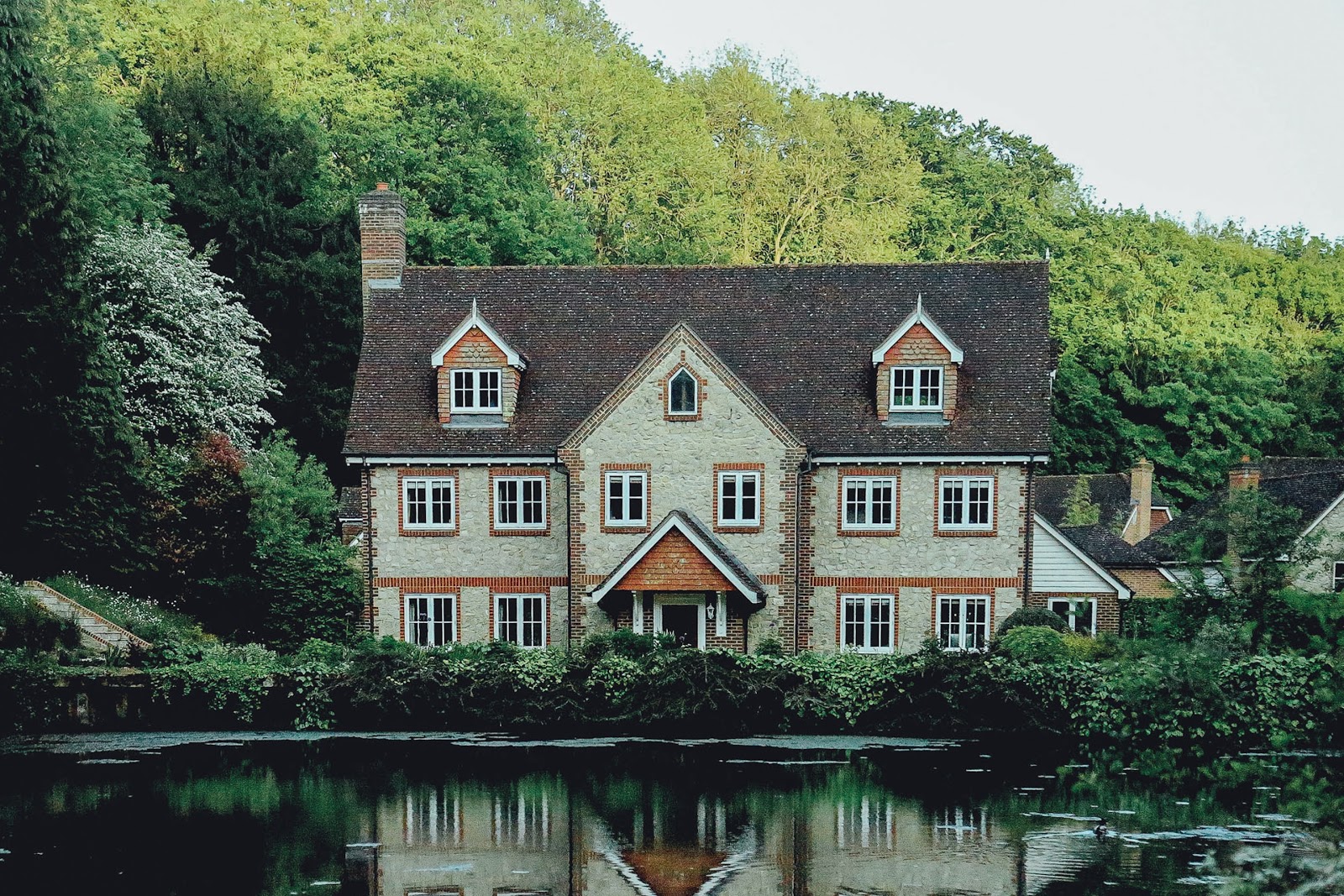One of the best things about living in Toronto is beautiful Lake Ontario. During the summer visiting the beaches on Lake Ontario, swimming in the lake, walking, biking or jogging on the paths next to the lake and boating on the lake is amazing. Living on the lake or living in a house with a lake view is dreamy. There are many benefits you can enjoy living on the lake, such as a potentially high return on your investment, waking up and looking at a beautiful lake every morning, and easy lake access for watersports and other outdoor activities. While living in Lake Ontario can be great fun, lake living might not be right for everyone. Before buying a lake view or lakefront house in Toronto, it is important that you consider the pros and cons so you can decide whether or not living on Lake Ontario is right for you.
Related article: How to Find the Best Places to Live in Toronto?
Pros For Buying A Lakeview House In Toronto
Toronto’s hot real estate market and the increase in sale prices for homes in the Greater Toronto area, make investing in Toronto real estate, especially now a great idea, given that the Toronto real estate market has been growing so much recently, it’s not uncommon to hear stories about buyers getting into bidding wars over Toronto area homes. If you are buying a house with a lake view, it’s highly likely you will see a return on your investment.
Houses with lake views or lake frontage in the city of Toronto are scarce so you can expect to probably receive a high return on your initial investment when it comes time to sell your house. It is not uncommon for houses in Toronto to be sold for more than the seller’s asking price, with buyers fighting over homes. This is especially true for houses with views of Lake Ontario or located on Lake Ontario itself, especially lakefront houses located within the City of Toronto to sell for more than the seller’s original asking price.
During Toronto’s hot summers there is no better place to be than at the lake. Living in a lake view house means you will be steps away from the lake! You will be able to take advantage of all that living on the lake has to offer during the warmer months, such as boating, swimming at the beaches and walking next to the lake. On hot summer days, you will be able to easily take a dip when you need to escape the heat. Living next to the lake helps ensure that you will enjoy excellent views of the fireworks for Canada Day, from your home. You will be able to host friends and family at your home to celebrate Victoria Day and Canada Day and watch the fireworks on Canada Day, which will make you the envy of your friends and family. And if you are a dog owner and your dog(s) enjoy swimming, your dog(s) will love you for moving to a place where they can swim and enjoy the water.
Living on the water might even help motivate you to get outside and be more active so you can enjoy nature. Moreover, you will be in the perfect spot to enjoy beautiful sunrises and sunsets, which will make for great photos and great experiences. Living by the water is relaxing so you can home to your lakefront oasis and feel relaxed at the end of a hard day’s work, looking out onto the water. You can fall asleep and wake up to the sounds of nature living by the lake, this would not possible in many other houses in other areas of Toronto.
Recent studies have even shown that humans are happier, more creative and report feeling calmer when they are near water since something there is something primal that draws us to the water. While studies have shown that being the near the water can help off depression and anxiety, which are becoming increasingly common in our modern, hyperconnected era. Living here by the water can help you to reconnect with nature and yourself, providing you with a much-needed opportunity to disconnect for a short time. Having the ability to spend more time on a daily basis in a more natural setting and having time to disconnect and enjoy your natural surroundings, has the potential to help you become a healthier, happier, and more productive person. While living in Lake Ontario could be amazing, there are some cons you should be aware of.
Cons For Buying A Lakeview House In Toronto
First, lake view houses in Toronto, houses on the water or with a view of the lake are usually more expensive than houses without this view or lake frontage. Since these houses are more expensive, your property taxes for a lake view house might cost significantly more than a house without a lake view. Your annual costs will probably be higher than if you lived in a regular house in Toronto. Another issue related to cost is moisture.
The closer you are to the water, the more easily things can rust. Excessive moisture can cause other issues such as mould, and mildew. Therefore, the money you will be spending on regular maintenance and upkeep for your house might be higher living by the water than if you were not living by the water. You will have to be vigilant about moisture here and making sure items are not rusting because of the moisture. While moisture is negative about living here, the weather is another thing to consider.
While living at the lake during the warmer months can be positively dreamy, during the winter living here might not feel so dreamy. During the colder and winter months in Toronto, the closer you are to the lake, the colder your home will be, given the sometimes strong winds coming off of Lake Ontario. These winds can be particularly cold so you might need to pay more money to heat your home during the winter and to insulate your home to prevent heat loss when it is windy on the lake. During the winter, if you are living in a more isolated or rural area, the access road(s) to your home might not be plowed for free or you may need to pay a special fee to have them plowed. Also, some of these access roads might not be well maintained, so you might only be able to access them using 4WD or AWD vehicles during inclement weather. Furthermore, the lake does not always smell fresh, with the wind coming off the lake so you might be smelling the unpleasant smells coming off the lake throughout the year.
Another issue to consider is safety. If you have small children or pets you might need a fenced yard for them where they can play and run around without fear of them going in the water accidentally. Living by the water might not be the best choice for you if you have small children or pets, who could accidentally get out and get into the water unsupervised. There are other additional costs you might be responsible for paying living here as opposed to living in a more conventional home.
For example, many rural waterfront properties get their water from lakes or wells, if this will be the case for you, you will need to have an inspection done to ensure that the water is potable. Additionally, you will need to figure out what sewage system is being used on a lakefront/waterfront property. If the house includes a septic system, you will need to have someone inspect this septic system to ensure that it is in good condition and in good working order. Repairing and/or replacing an older septic system can be extremely expensive. Even if the septic system is in good working order, it will need to be cleaned and emptied regularly, which is an additional cost you will be responsible for paying. While you might be reading this list and thinking the list of cons is long, there are even more things to come.
While this might not be the case for lake view houses in more urban or suburban areas in Toronto, since these areas tend to be well-zoned there are many zoning regulations unique to waterfront properties. Most municipalities have environmental and zoning regulations which regulate and limit the size of any new structures built, how far you can build onto the shore or how far you can build a deck/structure from the shore. So, if you are planning on doing any major builds, additions, renovations, etc. you will need to look into and familiarize yourself with these regulations. There are also other regulations you should familiarize yourself with.
For example, in many cases (in Canada), the Crown retains the right to build on the shore, this is called a Shore Road Allowance. Anyone who owns a building encroaching on the Shore Road Allowance could face some major problems if the government eventually plans to develop this land. Ideally, you should be looking for waterfront property with a “closed” shoreline so you can avoid running the risk that the government might want to develop this land in the future. When considering zoning, it is important to consider surveys and inspections.
While this might not apply for houses in urban and suburban areas surrounding Toronto, many waterfront properties, especially in rural areas, have never been surveyed, this means that encroachments and easements may have gone unnoticed. If your property has not already been surveyed, you should consider having it surveyed before closing, to avoid any potential legal headaches down the road. And you should definitely have the home inspected to avoid any potential nasty surprises. To the untrained eye, a house might appear to be in good shape but a good home inspection can help you avoid nasty surprises and headaches.
There are several steps involved in the process of purchasing a lake view house in Toronto. The steps in this process will vary from buyer to buyer, agent to agent, and broker to broker. However, the steps listed here are the basic components of this process.
Steps For Buying A Lakeview House In Toronto
1. Determine your budget, type of house and desired neighbourhood(s)
Before buying a house, you will need to determine what your budget is. You will need to figure out how much you are willing to spend and how much you will be able to pay for a given house? You will also need to determine what types of houses you want to see i.e. townhouse, duplex, detached home, single family home, etc. You will need to have a list of must haves and things you are looking for in your ideal house and have a list of things that would be nice to have but you can live without them. And you will need to know what neighbourhood(s)you are interested in moving to.
Another important consideration is are you willing to renovate or do things to a house that might be right for you even if it not is move-in ready or not designed in your style? Are you willing to purchase a fixer-upper? If you are, you will need to consider your budget for repairs, renovations, additions, etc. Are you willing to purchase a house that is in the pre-construction phase or new construction or do you want a house that has already been built? Once you have figured out your answers for these questions, you can proceed to step two.
Related article: Types of Houses in Canada and How to Get the Best Price for Them
2. Find a great real estate agent/broker to represent you, the buyer
Before you begin looking at houses, you should find a great agent or broker who has experience finding waterfront or lake view houses and is knowledgeable about the neighbourhood(s) you are interested in, who you like and feels comfortable working with. It is important to remember that the houses you might be visiting during open houses on weekends are staffed by real estate agents who have a relationship with the seller. These agents are usually representing the seller, as the seller’s agent and they are duty bound to act in the seller’s best interest, not in your (the buyer’s) best interest. The seller’s agent’s primary job is to ensure that the seller is getting the highest price possible for the home they are selling. Therefore, it’s important that you have your own real estate agent or broker who can best represent your interests, as the buyer.
3. Get pre-approved for a loan if you have not already done so
Ideally, before you are looking at homes with your agent or broker, you would have already been pre-approved for a loan or have sufficient funds ready for when the time comes for you to make an offer on the house of your dreams. Ideally, you want to have the money lined up before you are looking at homes and have your financial situation figured out before you begin to seriously look at homes to buy.
4. Look at homes
Now, this is the fun part, it’s time to start looking at homes and hopefully, you will your dream house soon! At this point you are probably looking at houses with your agent or broker and/or possibly by yourself, visiting open houses on weekends. Hopefully, you are enjoying this process and are finding good prospect homes with your agent/broker.
5. Find your house
At this point, hopefully, you have found your dream home by now. Now it’s time to make an offer and then it’s time to wait. It may take some time to hear back from your real estate agent/broker as to whether or not the seller(s) have chosen to accept your offer.
6. Sign the Agreement of Purchase and Sale (APS)
Congratulations, the seller(s) have accepted your offer! Now it is time to celebrate and then you will sign the papers so you can purchase your future home. When the day to sign the APS arrives, you will need to arrive prepared with a valid government-issued photo ID (i.e. driver’s license or passport) and your chequebook, since you will not be able to purchase your home without them. Your real estate agent/broker will walk you through the signing process and answer any other questions you might have at this time.
7. Home Inspection and Property Survey
Before closing and taking possession of the house, it is important you have the house and any structures if there are any other structures on this property inspected. Having your property surveyed will help you avoid possible legal headaches related to easements and encroachments. It is important to have your home inspected before closing so you can have the seller fix anything that needs to be fixed.
8. Closing
Time for closing, today for your closing appointment you will meet with your lawyer and/or agent/broker possibly meet with real the seller and their lawyer(s). Today, you will make your final payments, begin the process to have the title and ownership of the house transferred to you and you will get the keys to the house. Congratulations the house and property will be yours!
Related article: Justo brokerage model includes lawyer, inspection fees
9. Moving In And Occupancy
Congratulations! The big day has come and it is time to move into your new home! Hopefully, you have secured movers and are ready to live in your new house or have prepared to do any work you need or want to do for your house. In an ideal world, you will be planning a housewarming party after you have settled in for friends, family, and if applicable colleagues to come to visit you and see your new home on the lake.
Things To Keep In Mind
Whenever making an important decision such as buying a home, especially a house on the waterfront, there are some things you should keep in mind, such as taxes, maintenance, upkeep, your objectives for buying a home, and more.
Another important thing to keep in mind when looking at and purchasing lake view houses within the Amalgamated City of Toronto is that it is estimated that there are less than 400 houses within the City of Toronto with direct waterfront access. There are more homes in the Greater Toronto Area (GTA) that have direct waterfront access in the suburbs and surrounding area but houses with direct waterfront access in Toronto are scarce. The houses in Toronto with direct access to Lake Ontario tend to be extremely expensive, a house with lake frontage in the City of Toronto sold in 2017, was listed for a lower price and when it was eventually sold, it was sold for hundreds of thousands of dollars more than the original asking price. However, there are many more lake view apartments and condos available in the City of Toronto than lakefront houses in the City of Toronto.
Another important consideration is the location of your home in relation to transportation, subway stations, major roads, etc. For example, if you are looking at houses in the Beaches or Upper Beaches neighbourhood you are farther away from transportation such as metro stations that are a part of the Toronto subway system. If you are leaving on Beaches or Upper Beaches there are no metro stations nearby. In order to access the subway system and the rest of Toronto without a car, you would need to take the streetcar here. This is important since Toronto is one of the densest cities in North America. And the traffic in Toronto can be bad given the number of people living in the Greater Toronto Area and the size of the city, so you might be spending a while sitting in traffic depending on where you live.
Another consideration is areas like Beaches and Upper Beaches are extremely wealthy, and for a variety of reasons, they are not known as being diverse places economically or ethnically. If you are looking to live in a neighbourhood that is not totally ethnically, racially or economically homogeneous, you might not find this in some of the communities where you can find waterfront properties in the Toronto area. If you are looking for an ethnically, racially, and/or economically diverse neighbourhood, you might want to look in a different area.
Related article: The Ultimate Buyer’s Guide for Buying a House in Toronto
Conclusion
Buying lake view or lakefront house in Toronto is not for those lacking patience, flexibility, and a love for the water. Living on the water has its benefits and joys but it has its risks, it can cause some headaches and be costly. However, if you are willing to accept the challenges that living on the water may present, you might love living on Lake Ontario and have a great time. Living on Lake Ontario is definitely not for the faint of heart or people who hate being cold. However, if you plan well, are lucky and do your due diligence, you might be able to receive a high return on your investment, given how much home prices are in Toronto and how much they have increased. In order for you to reap the rewards for your investment, you will have to do your due diligence and carefully consider whether or not living on the water is the right choice for you.
Photo by Evelyn Paris on Unsplash
- The Impact of Interest Rate Cuts on Toronto’s Housing Affordability - April 23, 2025
- Bank of Canada Holds Interest Rate Steady Amid Tariff Uncertainty - April 19, 2025
- The Impact of Interest Rate Cuts on Toronto’s Housing Affordability - April 11, 2025






